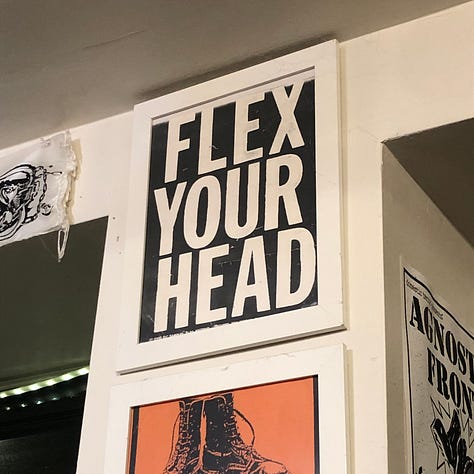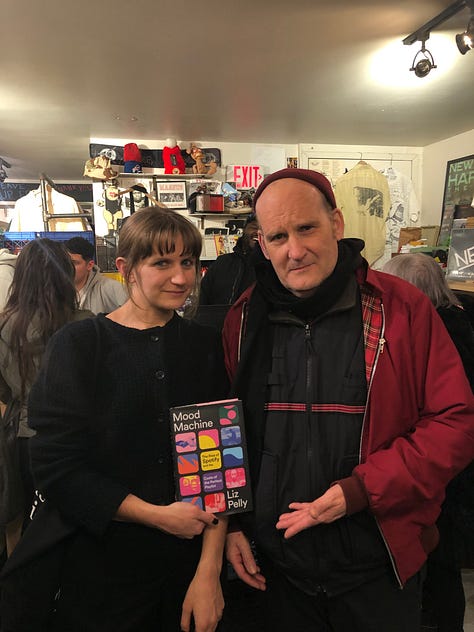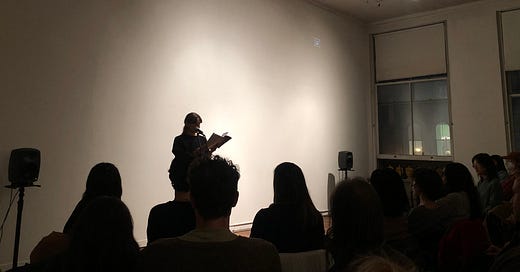In my previous Substack dispatch, sent on the 24th of January, I wrote, “Stay tuned for the next edition of this letter dedicated to my sister’s book Mood Machine!” Well, four months have passed, and… still no letter dedicated to my sister’s book Mood Machine. Hopefully you’ve heard all about it anyway. If you haven’t: Mood Machine is an unsparing investigation into Spotify for which Liz interviewed over 100 sources, building on her years of paradigm-shifting writing on the subject. It felt like an urgent undertaking three years ago and it feels even more urgent now. Mood Machine has become a best seller, featured everywhere from PBS and NPR to the cover of Harper’s, popping up in bookstore window displays all over NYC. I’ve never watched anyone work harder on anything than Liz worked on this book and I’m so proud of her.
I’ve attended eight Mood Machine events so far. The first was Liz’s debut public reading from the book as part of an avant-garde variety show at the Emily Harvey Foundation’s Soho loft. The second was a presentation at a Zohran fundraiser. Her release-day event at St. Joseph’s College with Max Alper (aka Peretsky aka La Meme Young) was so engaging and fun that it’s now spawned a podcast called Critical Listening; they just released episode one featuring Greg Saunier of Deerhoof, and I offer my highest recommendation.
Max’s first question to Liz at that event was about music’s social value, how it connects us to one another, which felt like a great starting point because this is what I imagine we want from a book like Mood Machine — fuel for a collective dialogue that is ongoing. I appreciate how Liz’s clear prose demystifies the obfuscated nature of streaming-era schemes and invites people into the conversation as participants. Liz said in an interview with Jonathan Bernstein for Rolling Stone that the real debate here is about contracting corporate power over culture and minimizing the influence of corporations in our lives. At her talks, it’s been great to watch these community conversations play out, everyone putting their heads together to wrestle with how to realistically confront the endless encroachment of tech upon music. This is counterculture to me in 2025: challenging status-quo technopoly and its relentless exploitation of our attention.
These events have been super fun for me personally, I have to say, and I loved tagging along to Liz’s readings in the DMV in January. In Baltimore we hung at the book and record store Normals (obsessed) way past closing time, asked the person working, “What time do you open tomorrow?” and returned promptly in the morning. For that event Liz was in conversation with local zine writer and high school teacher Tim Kabara, who was billed on the flyer as “Further reading by Tim Kabara,” so he read from a zine-in-progress titled “FURTHER READING” about a rare 1989 LP by the straight-edge hardcore band Judge. The next day in DC, at beloved record shop and ultimate hang zone Joint Custody, Liz spoke with music critic and all-around inspiration Chris Richards. Pointing out that Liz had saved the coveted Friday night slot of her tour for DC, Chris shouted out all the local legends interviewed in the book (Jenny Toomey, Kevin Erickson, Luke Stewart among them) and asked, “At what point in your reporting did you realize that Washington D.C. is home to both the smartest people and the coolest music scenes on our planet?” Great question; replies encouraged! A number of young people from a local high school’s Luddite Club showed up. Look who else came through. As Chris has often noted, “DC remains undefeated.”



Since this letter has now turned into a Mood Machine tour diary, I’d be remiss to not mention the incredible interview WNYC’s John Schaefer did with Liz at the New York Public Library back in March; it was so interesting to hear John put Spotify’s “systemic grift” (quoting Liz) into a broader context of radio-industry malpractice, paltry artist payouts, and passive listening. I also participated in two Mood Machine book clubs in May, discussing the book with musicians, critics, music industry workers, and other extremely smart people, reflecting on the scariest details (i.e. Spotify laying the groundwork for AI takeover of music), how the streaming situation is making us contend with how to “revalue” music in a world that grossly devalues it, and what it means to be a truly intentional listener today. One conclusion has been that we should get Liz’s book into the hands of more law students.
I’ll put a pin in my Mood Machine thoughts for now, and begin my countdown to Liz dragging me for writing about all of this on Substack.
Another reason I am sending this letter tonight is because I have a very long story coming out imminently, which I started working on over a year ago, though in some sense, it’s been at least a decade in the making. It similarly deals with twinhood, attention, and going on tour, and it’s maybe my favorite piece of music journalism I’ve ever written.






Hey, Jenn, it's great to find you here. I just finished Liz's book and loved it. I'm reevaluating my relationship with Spotify, as well as my overall music habits, and realizing how much I've strayed from how I used to engage with it when I fell in love with record collecting in the 1990s. I'm looking forward to learning more about you and your projects, and I'll subscribe to your newsletter today. Take care!